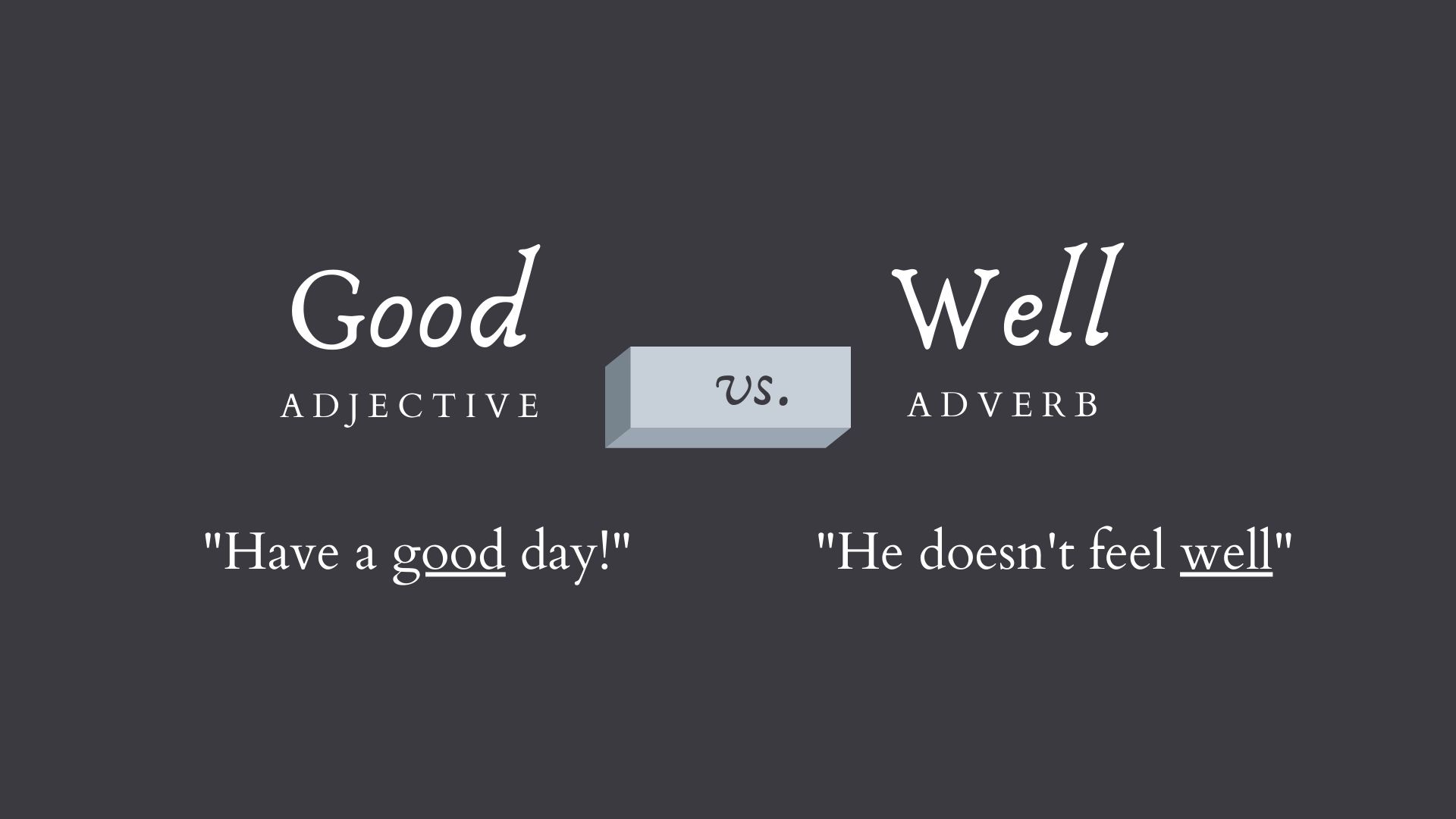Updated 28, November 2021: Good vs. Well: as small and simple as they might seem, these two words can confuse writers. Knowing which word to use in a sentence often poses a challenge.
Remembering Parts of Speech
The key thing to know is that good is an adjective while well is an adverb. That means that you should use good to modify a noun, whereas well modifies a verb. So:
- A person, place, thing, or idea might be
- An action might go
When you write a sentence and must decide whether to use good or well, determine if you are modifying a noun or a verb.
Related: What is a conjunctive verb?
When to Use Well
Here are some samples for modifying verbs:
Incorrect: We did good in the trivia contest.
Correct: We did well in the trivia contest.
Incorrect: I feel like that even went good.
Correct: I feel like that even went well.
In these examples, we are modifying verbs: did and went. As such, we need to use well as the modifier.
Related: Learn about modifiers.
When to Use Good
Here are some examples for modifying nouns:
Incorrect: Have a well day!
Correct: Have a good day!
In the examples above, we are modifying day, which is a noun. Consequently, we use the adjective good to modify it.

The Nonaction Exception
There are some exceptions to the adjective/adverb rule. One involves nonaction verbs. These include:
- To be
- To feel
- To look
- To seem
You can use the adjective modifier good. For example:
Example: I hope your vacation is good.
Example: This essay seems good.
The Health Exception
To complicate things, there is an exception to the nonaction verb exception. It involves health or wellbeing. When describing a person’s health and using a nonaction verb, you would default to well instead of good.
Incorrect: Eleanor was sick last week, but now she is good.
Correct: Eleanor was sick last week, but now she is well.
The examples above show how inference plays a role in the correct work. The expression be good implies behavior. Be well means physical and emotional wellbeing.

Sensory Verbs Exception
Finally, if you use a linking verb connected to one of the five senses, you would use the adjective good. Sensory verbs point to further information about the subject, not an action involving an object. They include:
- To appear
- To feel
- To look
- To seem
- To smell
- To sound
- To taste
Here are several examples of the correct use of good with a sensory verb:
Example: The fresh-baked banana bread smelled good.
Example: The orchestra sounds good tonight.
Linking Verb Exception
Linking verbs connect nouns to modifiers. The most recognizable linking verbs have to do with the senses: look, smell, sound, taste, etc. Concerning good and well, linking verbs function the same as non-action verbs. You use good with them.
Example: The pot roast smells good.
Example: The concerto sounds good.
Example: The chocolate sundae tastes good.
Example: The new curtains look good.
—
Test Yourself
Here is a little quiz to test your newfound knowledge:
1. He ran very good/well for his age.
2. The family had a good/well time last week.
3. Still recovering form a cold, it is unlikely she will feel good/well enough to play softball tomorrow.
4. This suite look good/well on you.
5. The new sofa looks good/well.
6. My wife’s cooking always smells good/well.
7. The siblings did quite good/well on the test.

Quiz answers:
1. He ran very well for his age.
2. The family had a good time last week.
3. Still recovering form a cold, it is unlikely she will feel well enough to play softball tomorrow.
4. This suite look good on you.
5. The new sofa looks good.
6. My wife’s cooking always smells good.
7. The siblings did quite well on the test.
Want to sharpen your business writing skills? Discover our acclaimed online courses.






